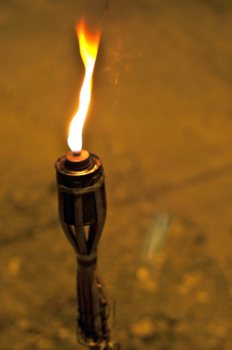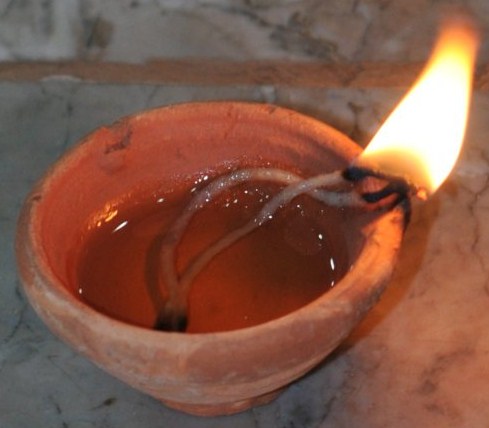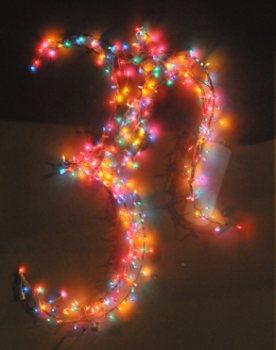|
Diwali
Significance of Divali,
Diwali or Deepavali
Divali is the festival of light,
people from all age groups participate in this traditional welcoming of the New
Year, celebrated earlier than usual this year - it is deemed the longest
night nearest the new moon. Hindu people give _expression_ to their happiness by
lighting earthen 'diyas' about 5p each (lamps),
decorating the houses, bursting firecrackers and inviting friends and
relatives to their houses for a sumptuous feast.
The lighting of lamps is a way
of paying obeisance to god for attainment of health, wealth, knowledge, peace,
valor and fame. It is one time in the whole year that children volunteer to
leave their beds long before the day begins. In fact, the traditional oil bath
at 03:00 is the only chore that stands between them and the pre-dawn adventures,
the same excitement felt by those who wait for a visit from Santa
Claus.

We got dressed up and ready by the
gate to go with Jessie and three groups to the village where Jessie grew up -
Felicity. We first went to a Temple where Sunni
welcomed us and a trio of Tassa drummers. Jessie told us we could take as many
pictures as we wanted to and get into the festive spirit, he said the
locals light up little oil lamps, candles and scented sticks
(agarbathis), set light to sparklers, fire crackers and home made "things"
made of bamboo about three notches long infused with kerosene. Competition is
stiff for the best lit house - no reason the Christmas lights cannot be used as
well. We were told to expect little gifts of sweets, biscuits and food from
the villagers.
  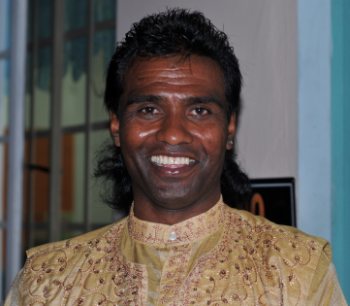
Tassa group
welcome. Bear in the temple and our aide
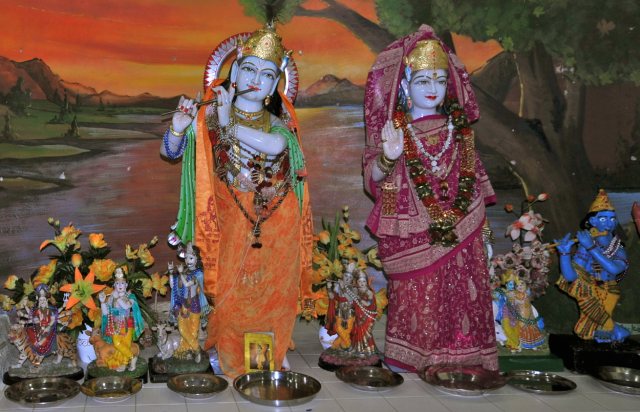
  
 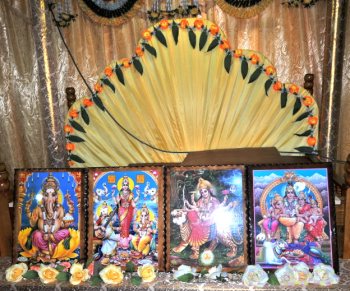 

 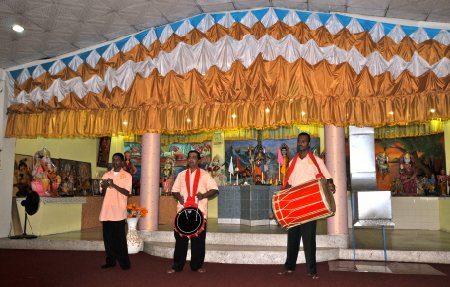
Amita danced
for us and the tassa group performed in the temple.
The colours were spectacular.
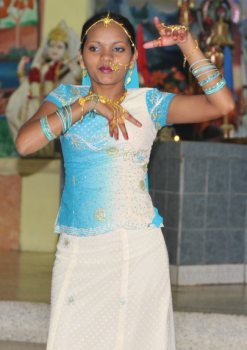 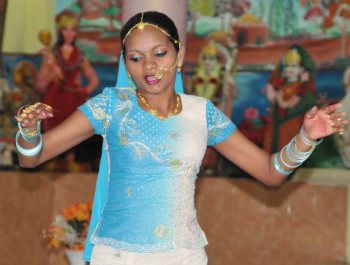 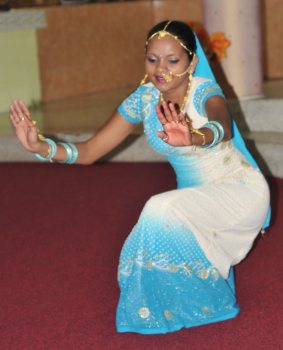
  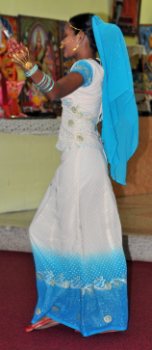
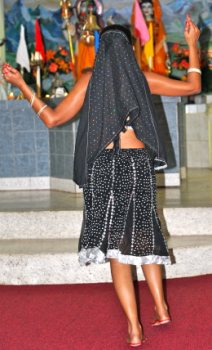  
Second dance. The boys in the group were
sad to find out that the beautiful Amita got married four months ago. Her mum
was at the back watching.
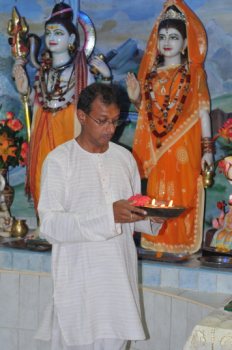  
People came and offered
their prayers
 
The feast laid on
for us was curried chick peas, stewed pumpkin, a mango/ginger dish,
spiced vegetables and roti bread all served on a plantain.
  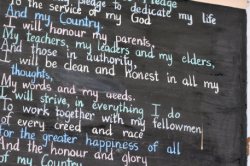
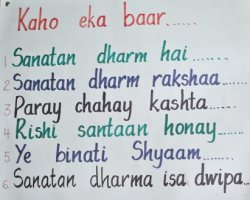 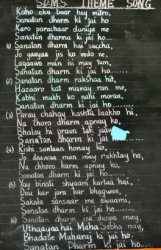 
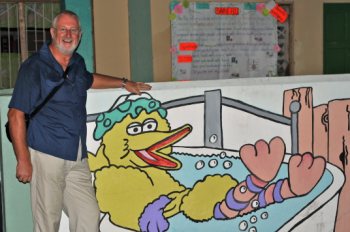 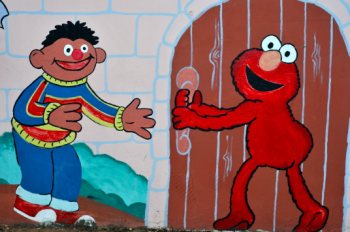 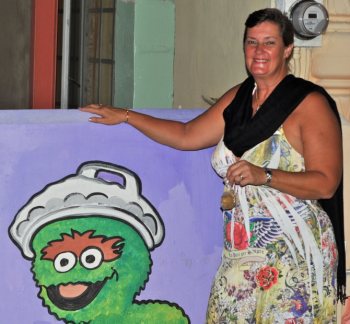
While the first group ate we went to
explore the school opposite, by now it was dark and
the street was beginning to get a party atmosphere, lamps being lit.
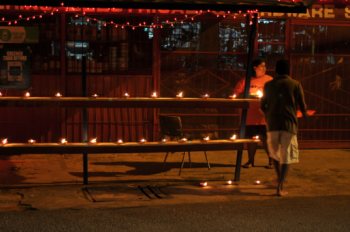 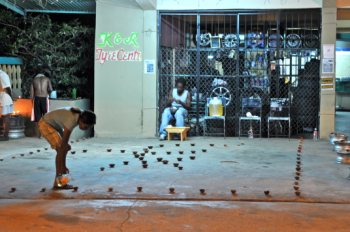 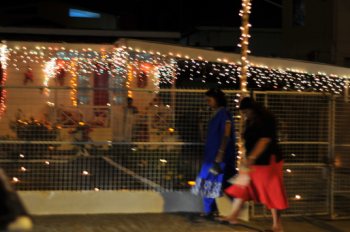
All day bamboo
frames are built, wet clay daubed and while still wet the little lamps
set, filled with coconut oil and a wick to be lit as soon as dark came. or the
best sparklers and flowerpots, the rockets and Vishnu chakras, which light-up
the night sky like a thousand stars. Grown-ups are the soul of generosity.
Festive bonhomie abounds.
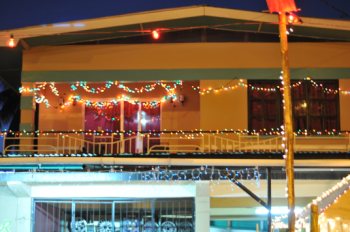  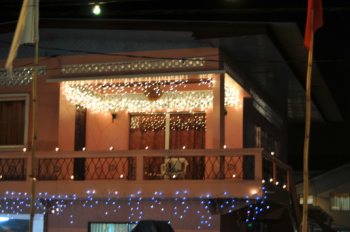
History of Diwali
India is a land of festivals. Diwali, the Festival of Lights, is
celebrated with fervor and gaiety. The festival is celebrated by young and old,
rich and poor, throughout the country to dispel darkness and light up their
lives. The festival symbolizes unity in diversity as every state celebrates it
in its own special way. The celebration of the four-day festival commences on
Aswayuja Bahula Chaturdasi and concludes on Kartika Shudda Vijiya. The first day
of the festival Naraka Chaturdasi marks the vanquishing of the demon Naraka by
Lord Krishna and his wife Satyabhama.
'Puranas' have it that Naraka, son of Bhudevi, acquired
immense power from a blessing given by Lord Brahma after a severe penance. He
soon unleashed a reign of terror in the kingdom of Kamarupa, harassing celestial
beings with his invincible might. Unable to bear the tyranny of the demon, the
celestial beings pleaded with Lord Krishna to save them from his torture. But
Naraka could not be easily killed as he had a boon that he would face death only
at the hands of his mother Bhudevi. So, Krishna asks his wife Satyabhama, the
reincarnation of Bhudevi, to be his charioteer in the battle with Naraka. When
Krishna feigns unconsciousness after being hit by an arrow of Naraka, Satyabhama
takes the bow and aims the arrow at Naraka, killing him instantly. Later Lord
Krishna reminds her of the boon she had sought as Bhudevi. The slaying of Naraka
by Sathyabhama could also be taken to interpret that parents should not hesitate
to punish their children when they stray on to the wrong path. The message of
Naraka Chaturdasi is that the good of the society should always prevail over
one's own personal bonds.
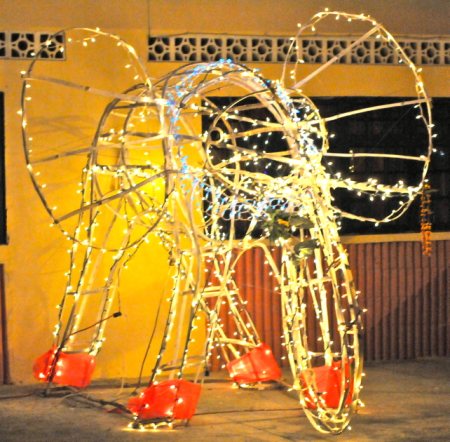 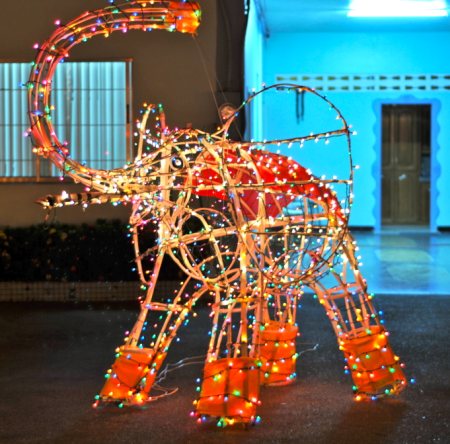
The second day is Amavasya when Lakshmi puja is
performed. It is believed that on this day Goddess Lakshmi would be in her
benevolent mood and fulfill the wishes of her devotees. One version says that it
was on this day that Goddess Lakshmi emerged from Kshira Sagara (Ocean of Milk)
when the Gods and demons were churning the sagara (ocean) for nectar (Amrit).
The other version is that when Lord Vishnu in the guise of Vamana, sought three
feet of land from the generous demon king Bali, the latter had to surrender his
head as Vamana had conquered the earth and the sky in two strides. Lord Vishnu
banishes Bali into the Pathala Loka (netherland) by keeping his third stride on
Bali's head. Later, pleased by his generosity, Lord Vishnu grants him a boon and
he in turn requests the Lord to guard his palace at Pathala Loka. Meanwhile, the
Goddess is unable to bear the separation and her grief affects the functioning
of the entire universe. Brahma and Lord Shiva offer themselves as guards and
plead with Bali to relieve Vishnu. So, on the Amavasya day, Lord Vishnu returns
to his abode and Goddess Lakshmi is delighted. It is believed that those who
worship Goddess Lakshmi on this day would be bestowed with all the riches.
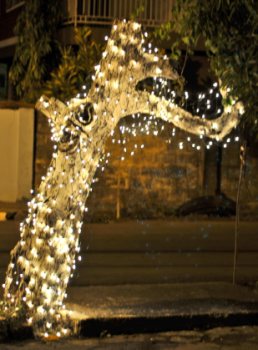 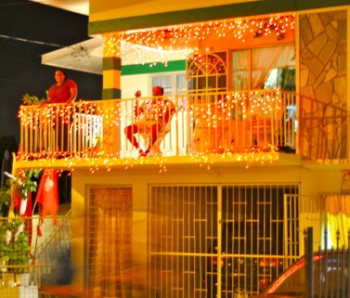 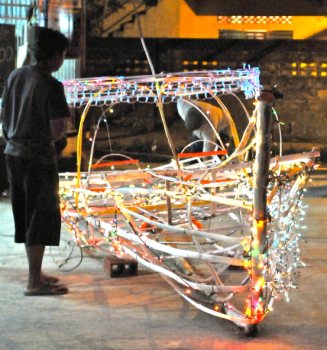
The third day is "Kartika Shudda Padyami." On this day
Bali would come out of Pathala Loka and rule Bhuloka as per the boon given by
Lord Vishnu. Hence, it is also known as "Bali Padyami".
The fourth day is
referred to as "Yama Dvitiya." On this day, sisters invite their brothers to
their homes.
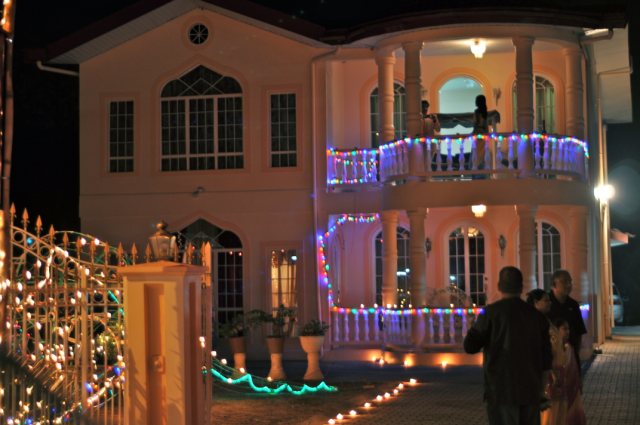
However, in the northern part of India it is celebrated
as the return of Ram along with Sita and Lakshman from his 14 years of exile
after killing Ravana. To commemorate his return to Ayodhya, his subjects
illuminated the kingdom and burst crackers. For the Gujaratis, Marwaris and
other business community Diwali marks the worship of Goddess Lakshmi and also
the beginning of the new financial year. For Bengalis, it is the time to worship
Goddess Kali or Durga. The Goddess Durga continued her "Vilaya Tandava" even
after killing demon Mahishasura.
 
Everyone we met we said "Shubh Divali", greeted back, given
gifts and generally made very welcome.
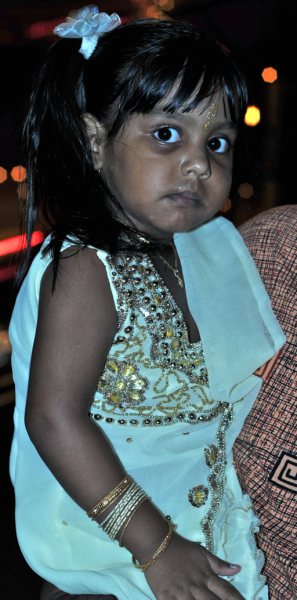 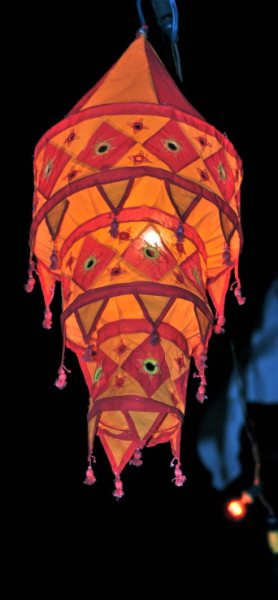 
Puja was tired and got her daddy to
carry her, a street lamp and a little girl we named
"princess"
  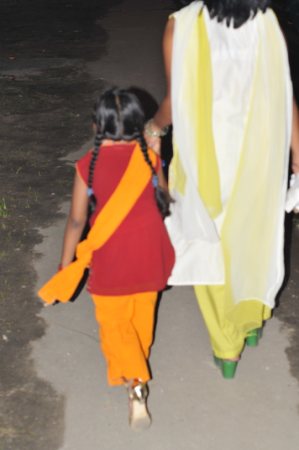
Bear and a beautiful lady. A family who knew Kent and a little girl wanting her sore feet rubbed.
  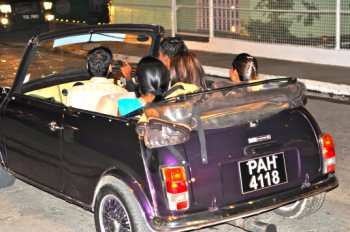
The main street, Hindi prayer flags
and even a mini flashing it's lights
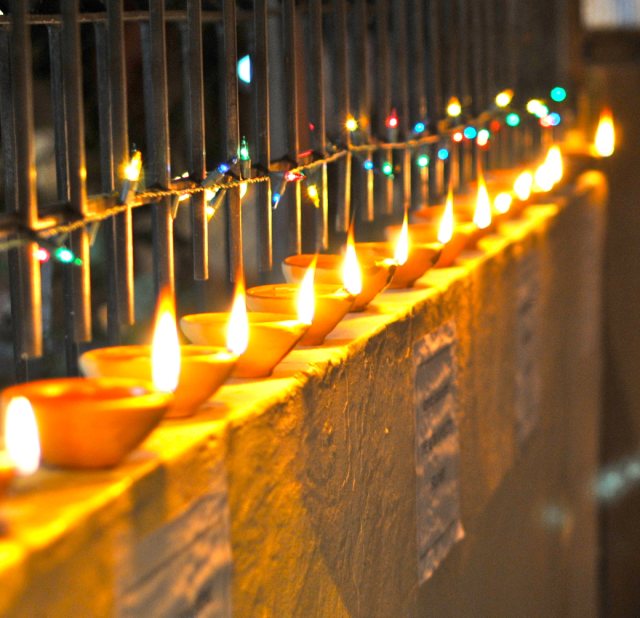
ALL IN ALL A WONDERFUL CELEBRATION TO HAVE
SEEN - ANOTHER UNIQUE EXPERIENCE IN ANOTHER
CULTURE
| 


